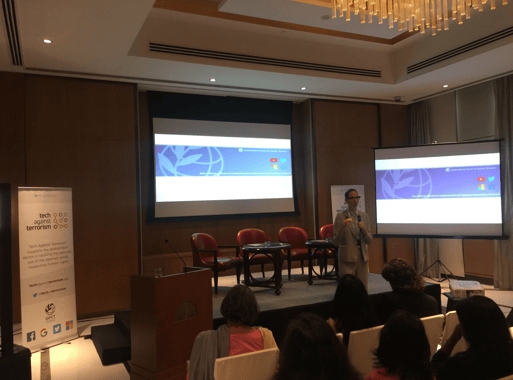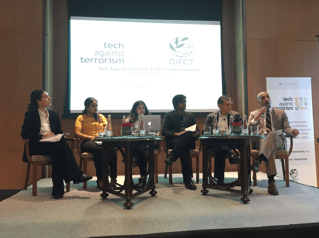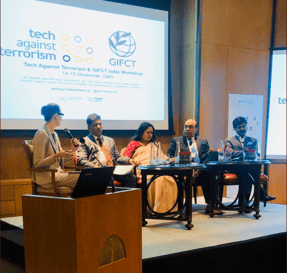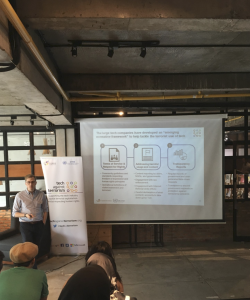Tech Against Terrorism & GIFCT Workshop in Delhi
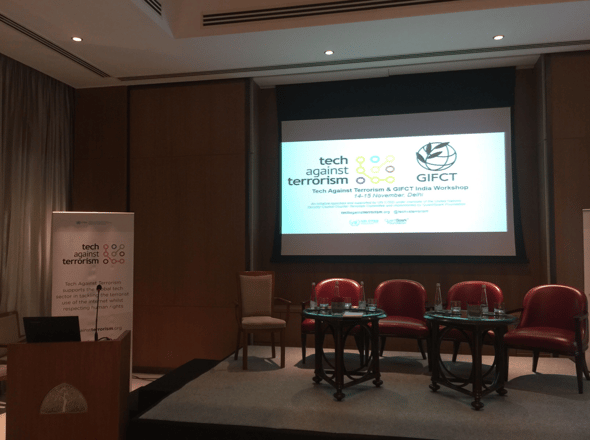
On 14-15 November 2019, Tech Against Terrorism and the Global Internet Forum to Counter Terrorism (GIFCT) held a workshop in Delhi, India. Tech Against Terrorism and the GIFCT have now co-organised 13 of these workshops all over the world (in Berlin, Amman, San Francisco to name a few); this event was the first of its kind in India.
The workshop convened together 90 leading experts in counterterrorism, counter-extremism, and localized resiliency work from across India, Afghanistan, Sri Lanka, and Bangladesh. Experts spoke to government, law enforcement, academic, civil society and tech sector efforts.
The event mapped out regional trends and threat assessments, and discussed solutions for multi-sector partnerships and approaches. Speakers discussed regional and localized insights, but global trends were also highlighted – including perspectives from the US State Department's Senior Advisor for Cyber and representatives from multi-national Law Enforcement.
The workshop was held under Chatham House rules, but we have summarised the key takeaways from the event below.
Key findings
- This event demonstrated the importance of knowledge sharing between multi-sector stakeholders and cross-sector capacity building to support smaller tech platforms in tackling terrorist use of their platforms
- These global workshops allow exposure to different markets and work to strengthen relationships with different stakeholders all around the world. They also provide invaluable insight into localised contexts: this workshop emphasised the value of having local experts speak to the regional context of violent extremism in and around India and South Asia. Terrorism does not have one face, and understanding the variegated nature of terrorist ideologies, as well as how they interact with the online sphere, is vital to CTUI
- The key term for the Delhi event was a “whole of society” approach. Although technology is an enabler when it comes to violent extremism and terrorism, approaches to tackling these issues must bear in mind that technology does not create terrorists and there is no substitute for on the ground, in-community CVE work
- Tech Against Terrorism would like to extend its sincere thanks to the GIFCT for co-organising this event, as well as to Facebook India and ORF for their continued support throughout.
Insights
Models for Collaboration
- The first panel addressed models for collaboration between civil society, government and private sectors. Research showcased by the speakers looked at the variations in violent extremism that go beyond Islamist extremist trends, and highlighted the “self-other” dimensions across Asia. Various forms of nationalism, ethnic tensions, and hate speech leading to violence were addressed; however, discussion also stressed the need to protect human rights and to not engage in counter-terrorism at the cost of fundamental freedoms. To this point, speakers called for conceptual clarity around terms such as "terrorism" and "violent extremism," so as not to approach the issue in too broad a manner.
- Panelists also highlighted that the online space does not exist in separation from offline or real world trends. Self-radicalization online was ultimately debunked, seeing continued radicalisation in community-based approaches –though discussion recognised that online platforms are a catalyst and tool for radicalization that needs to constantly be evaluated.
- Panellists included: Shafqat Munir, Research Fellow & Head of the Bangladesh Centre for Terrorism Research; Ruhee Neog, Director, Institute of Peace & Conflict Studies; and Dr Sharri Clark, Senior Advisor for Cyber US State Department.
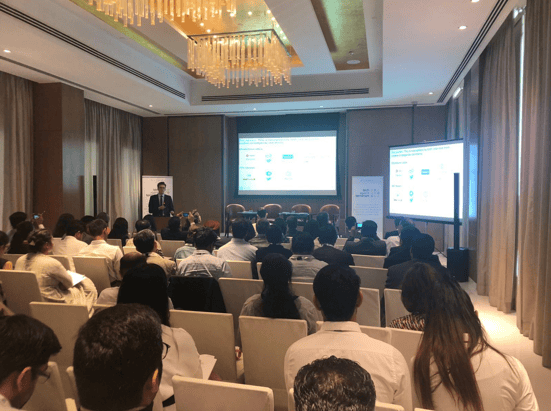
Programmes to Countering Violent Extremism
- The second panel looked at specific programs to counter violent extremism.
- Founders of India-based NGOs SMART and Impulse NGO Network, Archana Kapoor and Hasina Kharbhih, as well as Senior Fellow at Observer Research Foundation (ORF) Maya Mirchandani, spoke to on-the-ground efforts to champion local voices and recreate new empowering community narratives that could challenge recruitment to violent extremist networks. The need for new and local positive icons, heroes and role models was among key takeaways.
- Discussion concluded that traditional media is crucial as a means of optimising voices and local stories, particularly in conflict zones, and panellists drew attention to their efforts to train young journalists to this end.
State of Play
- The third panel, starting on Day 2, provided threat assessments with regards to terrorism and counterterrorism trends across the region.
- Speakers looked in-depth at India, Afghanistan, Sri Lanka, and Bangladesh, – analysing similarities and differences in approaches. Discussion cautioned against the tendency to overemphasise the role that technology plays in radicalisation, and emphasised that efforts to counter violent extremism and terrorism should be mindful of the "social" in social media.
- Speakers also explored the future threat of terrorist use of the internet, and how it will evolve within the local context.
- The line-up of speakers included Dr. Arian Sharifi, former Director of National Threat Assessment at the Office of the National Security Council in Afghanistan, Dr. Ajai Sahni, Director of Institute for Conflict Management & South Asia Terrorism Portal, Shruti Pandalai, Fellow at the Institute for Defence Studies and Analyses, and Kabir Taneja and Kriti M Shah, Fellow and Junior Fellow at the Observer Research Foundation (ORF).
Workshop
- Tech Against Terrorism and GIFCT’s workshops invariably include smaller breakout sessions that create a space for sectoral deep-dives. Each session, for tech company training, counterspeech training, and a law enforcement declassified threat assessment, allowed participants to directly engage with experts in the field in a candid and dynamic setting.
- At the tech company training session, Tech Against Terrorism explored best practice and practical tools to support the tech companies present with regards transparency, Terms of Service and Community Guidelines, and defining terrorist content.
- Participants are also encouraged to provide us with feedback on our approaches to tackling terrorist use of the internet, and how we can best support them to do the same.
Closing Plenary
The event concluded with a keynote plenary panel that featured Ankhi Das, Facebook’s Public Policy Director (India, South & Central Asia) alongside leading officials from the Indian Army, Indian National Security Council Secretariat and the President of the Observer Research Foundation (ORF) – Lt General (Retd) Syed Ata Hasnain, Mr. Shiv Sahai, and Samir Saran respectively.
Speakers again highlighted that each sector has a different role to play and should be working together in order to be ultimately effective. There is no one law, algorithm or campaign that will solve violent extremism. It is only when each of our sectors works in tandem with other sectors to tackle local and global trends in violent extremism that we see productive outcomes and impact.
